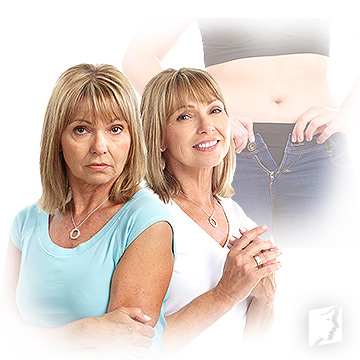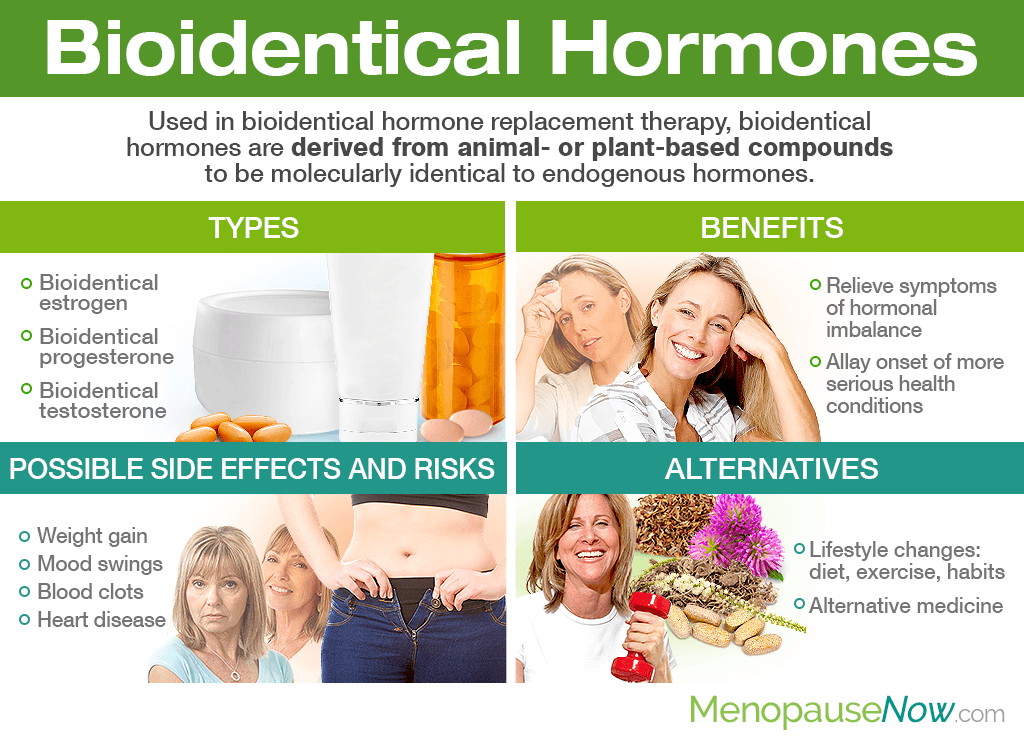As women leave their fertile years and experience the variety of menopause symptoms this transformative times evokes, many hear about relief found in bioidentical hormones. However, before making a firm decision to pursue treatment, it is important to educate oneself about its implications.
Continue reading to learn all about bioidentical hormones for menopause, including the benefits of bioidentical hormones, their side effects, and viable alternatives.
About Bioidentical Hormones
Bioidentical hormones, also called natural hormones, are hormones derived from animal- or plant-based compounds to be molecularly identical to endogenous hormones.
Accordingly, a treatment regimen that instills the use of bioidentical hormones is known as bioidentical hormone replacement therapy, or BHRT. Although pursued by women of various age groups, BHRT is most commonly taken by those passing through perimenopause and into postmenopause.
Also, although bioidentical hormone therapy is considered safer than traditional hormone replacement therapy (HRT), there is no evidence proving this. Natural hormones still have to be pharmaceutically manufactured in a laboratory in order to be of any effect.
Types of Bioidentical Hormones

The most common bioidentical hormones for menopause symptom relief are estrogen, progesterone, and testosterone:
Estrogen. Natural estrogen hormones on their own are only prescribed to women who have undergone a hysterectomy, or removal of the uterus.
Progesterone. Bioidentical progesterone can be prescribed alone or in combination with one of the other two hormones.
Testosterone. Bioidentical testosterone is rarely prescribed to women due to its possible masculinizing effects. If prescribed, it is usually in tandem with estrogen or progesterone.
Depending on a woman's medical history and personal preference, she may be prescribed a combination of hormones or individual ones in one of the following preparations.
Preparations of Bioidentical Hormones
Estrogen, progesterone, or testosterone bioidentical hormones are available in the following forms:
Oral preparations of pills or tablets
Vaginal preparations, including creams, suppositories, pessaries, or rings
Transdermal preparations, like implants, patches, sprays, gels, or creams
Sublingual preparations, such as drops
Intramuscular preparations, which are injections
Subcutaneous preparations of pellets
Speak with your doctor about which preparation suits your needs best. For example, women suffering only from vaginal dryness may prefer a vaginal cream versus a sublingual drop containing bioidentical hormones.
Benefits of Bioidentical Hormones

Since a woman's body cannot distinguish bioidentical hormones and endogenous ones, natural hormones can effectively treat an imbalance causing symptoms of:
- Hot flashes
- Night sweats
- Weight gain
- Difficulty concentrating
- Mood swings
- Vaginal dryness
- Dyspareunia
- Loss of libido
- Sleep disorders
- Loss of muscle mass
- And more
Moreover, for postmenopausal women, bioidentical hormones can help keep more stable hormonal levels, thus allaying the onset of more serious health conditions that can arise with official ovarian dysfunction, including memory decline, osteoporosis, and heart disease.
Bioidentical Hormone Therapy Side Effects and Risks

Any introduction of exogenous hormones into the body will pose the risk of adverse reactions, including, but not limited to:
- Weight gain
- Blurred vision
- Menopause acne
- Increased facial hair
- Spotting
- Cramping
- Bloating
- Mood swings
- Indigestion
- Fatigue
- Indigestion
Bioidentical hormone replacement therapy can also increase the risk of blood clots, stroke, gallbladder disease, heart disease, and breast cancer.
Furthermore, depending on the type of bioidentical hormone replacement implemented, it is not uncommon for women to also experience local irritation around the site of injection or application.
Alternatives to Bioidentical Hormones

Because natural hormone replacement therapy poses a myriad of risks and side effects, many women are turning to other options in order to encounter menopause symptom alleviation.
Just like bioidentical hormones, natural and effective menopause symptom treatments focus on tackling the underlying cause of hormonal imbalance to bring long-term relief.
This least invasive approach starts with instilling an improved diet rich in plant-based estrogens and centered around a healthy balance of lean protein, healthy fats, and complex carbs; consistent exercise for weight management and overall endocrine health; and healthy habits that focus on addiction control and stress relief.
In addition to these measures, women are recommended to pair their lifestyle changes with alternative medicine proven to reap the best results. Two time-tried options include phytoestrogenic herbal supplements and hormone-regulating supplements, both of which are detailed below:
Phytoestrogenic herbal supplements. This type of alternative medicine, including renowned herbs such as black cohosh and red clover, contains potent concentrations of phytoestrogens, which help allay an estrogen imbalance that may be causing symptoms. However, they, too, have exogenous hormones and are to be used short-term and with caution under the supervision of a certified herbalist.
Hormone-regulating supplements. On the other hand, hormone-regulating supplements, such as Macafem, do not introduce outside hormones into the body, yet nourish and encourage endocrine glands to produce more of their own. Thus, they are safer for long-term use against hormonal imbalance throughout and past the menopausal transition.
Conclusions
Natural hormone therapy for menopause symptom relief is more complex than some may have once thought. Needless to say, BHRT should be used with caution and always under the supervision of an experienced doctor who can measure hormonal levels regularly to judge treatment effectiveness. Nevertheless, as can be read, bioidentical hormones are not the only solution to hormonal imbalance. An improved quality of life and overall endocrine system health can be achieved naturally.
Sources
- Cleveland Clinic. (2014). Bioidentical Hormones. Retrieved August 13, 2019, from https://my.clevelandclinic.org/health/articles/15660-bioidentical-hormones
- Harvard Health Publishing. (2006). What are bioidentical hormones? Retrieved August 13, 2019, from https://www.health.harvard.edu/womens-health/what-are-bioidentical-hormones
- National Women's Health Network. (n.d.). Menopause and Natural Hormones. Retrieved August 13, 2019, from https://nwhn.org/natural-hormones-at-menopause/
- Office on Women's Health. (2017). Menopause treatment. Retrieved August 13, 2019, from https://www.womenshealth.gov/menopause/menopause-treatment
- UCI Health. (2019). Restoring balance with bioidentical hormones. Retrieved August 13, 2019, from https://www.ucihealth.org/blog/2019/03/bioidentical-hormone-therapy

